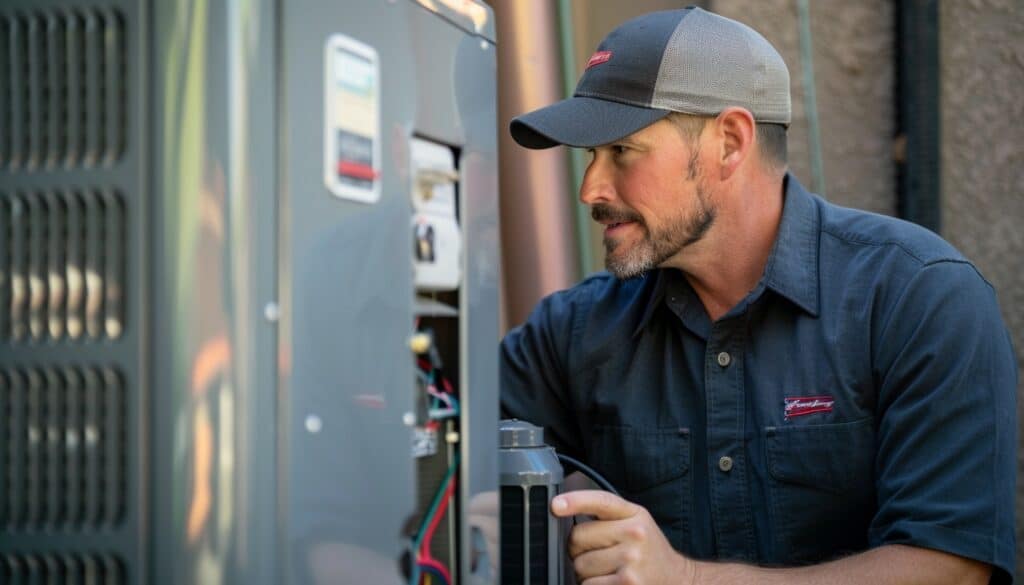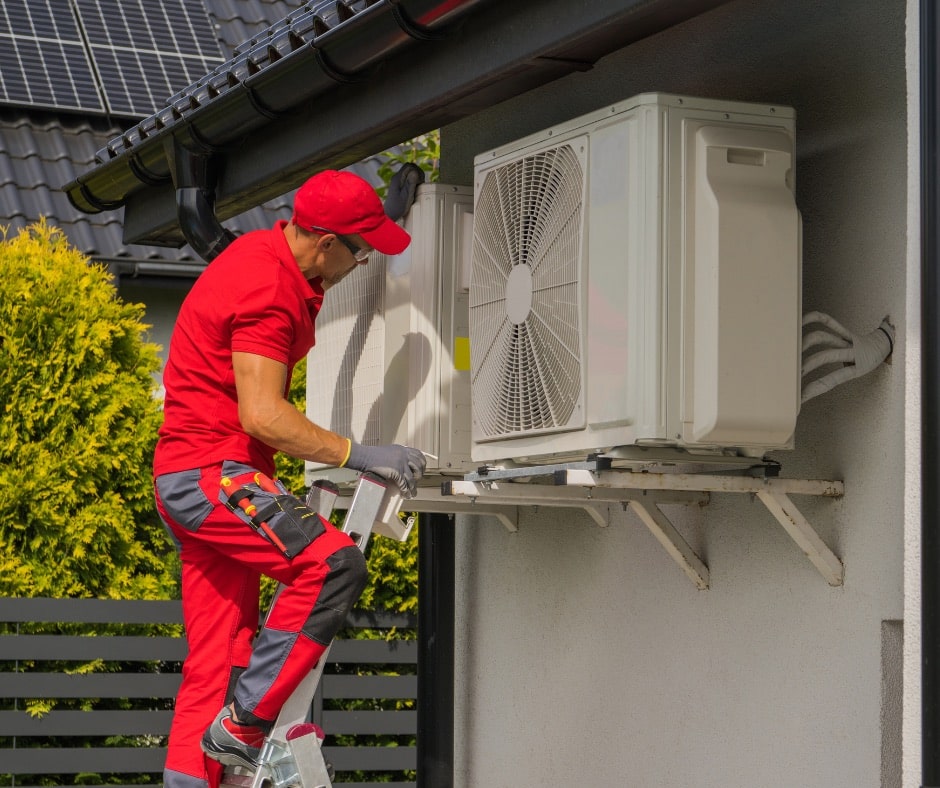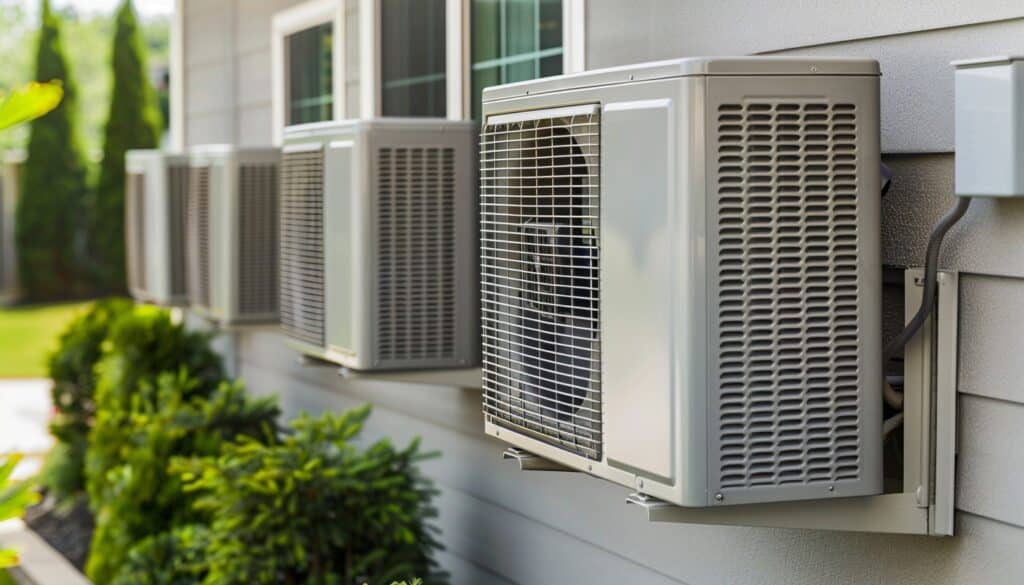Troubleshooting Your HVAC System: Common Failure Signs
Table of Contents
- Introduction: Understanding Your HVAC System
- Common Signs of a Failing HVAC System
- Why Regular Maintenance is Crucial
- What to Do When Your HVAC System is Failing
- Conclusion: Maintaining Your Comfort
- Frequently Asked Questions (FAQs)
Introduction: Understanding Your HVAC System
Your HVAC system plays a crucial role in maintaining comfort in your home by regulating temperature, humidity, and air quality. However, like any other mechanical system, it is susceptible to wear and tear over time. Understanding the signs that indicate your HVAC system might be failing is essential for preventing discomfort and avoiding costly repairs.

In this guide, we’ll explore the common warning signs that your HVAC system might be on the decline, why regular maintenance is key, and what steps you should take if your system starts to fail. We’ll also discuss how to choose a new HVAC system if replacement becomes necessary.
Common Signs of a Failing HVAC System
Recognizing the early signs of a failing HVAC system can save you from unexpected breakdowns and expensive repairs. Here are the most common indicators that your HVAC system might be failing:
1. Unusual Noises
Your HVAC system should operate relatively quietly. If you start to hear banging, clanking, or screeching sounds, it could indicate a mechanical issue within your system. These noises might be due to loose parts, a failing motor, or issues with the blower fan.
Signs to Watch For:
- Banging or clanging sounds: Often indicate loose or broken components.
- Screeching or squealing: May suggest a problem with the blower motor or a belt that’s wearing out.
- Hissing: Could be a sign of a refrigerant leak, which needs immediate attention.
2. Inconsistent Temperatures
If some rooms in your home are too hot while others are too cold, it could be a sign that your HVAC system is struggling to distribute air evenly. This inconsistency often points to issues such as clogged ducts, failing components, or improper system size.
Potential Causes:
- Blocked or leaking ducts reducing airflow to certain areas.
- A failing thermostat not properly regulating temperature.
- An aging or undersized system that can’t keep up with the demand.
3. High Energy Bills
An unexplained spike in your energy bills could indicate that your HVAC system is working harder than necessary to maintain your home’s temperature. This extra strain might be due to inefficiencies within the system, such as dirty filters, clogged ducts, or worn-out components.
Efficiency Issues to Consider:
- Dirty filters causing your system to use more energy.
- Leaky ducts allowing air to escape, reducing overall efficiency.
- Aging components that can no longer operate at peak efficiency.

4. Frequent Repairs
If you find yourself frequently calling a technician to fix your HVAC system, it might be a sign that it’s nearing the end of its lifespan. Frequent repairs can quickly add up in cost and might not be worth it in the long run, especially if the system is old.
When to Consider Replacement:
- If your HVAC system is more than 10-15 years old and requires frequent repairs.
- When the cost of repairs exceeds the cost of a new system.
- If your system uses outdated technology that’s difficult or expensive to repair.
5. Poor Air Quality
Your HVAC system plays a significant role in maintaining your home’s air quality. If you notice an increase in dust, mold, or unpleasant odors, it could be a sign that your HVAC system is not functioning properly. Issues such as clogged filters, dirty ducts, or failing components can all contribute to poor indoor air quality.
Air Quality Red Flags:
- Increased dust levels even after cleaning.
- Musty or burning smells from the vents.
- Frequent allergy or respiratory issues among household members.
6. System Age
The age of your HVAC system is a critical factor in determining its efficiency and reliability. Most systems are designed to last between 10 to 20 years, depending on the type and quality. As your system approaches the end of its lifespan, it becomes more prone to failures and less efficient.
Age-Related Considerations:
- Systems older than 15 years may be less efficient and more likely to break down.
- Older systems may not be compatible with newer, more energy-efficient technologies.
- An outdated system might be costing you more in energy bills than it’s worth.

Why Regular Maintenance is Crucial
Maintaining your HVAC system is vital to ensure it operates efficiently and has a long lifespan. Regular maintenance can prevent many of the common issues that lead to system failure.
1. Extending System Lifespan
Regular maintenance, including annual tune-ups and inspections, can significantly extend the life of your HVAC system. By catching small issues before they become major problems, you can avoid premature system failure.
Maintenance Tips:
- Schedule annual HVAC inspections.
- Replace air filters every 1-3 months.
- Keep outdoor units free from debris.
2. Preventing Breakdowns
Preventive maintenance helps ensure that your system is always running smoothly. Technicians can identify potential problems during routine inspections, allowing you to address them before they lead to a breakdown.
Preventive Steps:
- Regularly check and clean air ducts.
- Test your thermostat for accuracy.
- Ensure proper lubrication of moving parts.
3. Improving Efficiency
A well-maintained HVAC system operates more efficiently, which can lead to lower energy bills and a more comfortable home. Simple maintenance tasks like cleaning coils, tightening connections, and adjusting settings can improve your system’s performance.
Efficiency Boosters:

What to Do When Your HVAC System is Failing
If you’ve noticed any of the signs mentioned above, it’s crucial to take action before your HVAC system completely fails. Deciding whether to repair or replace your system depends on several factors.
1. Repair or Replace?
One of the biggest decisions homeowners face is whether to repair or replace their HVAC system. If your system is relatively new and the repair costs are low, repairing might be the best option. However, if your system is old and the repairs are costly, replacement might be more cost-effective in the long run.
Considerations for Replacement:
- Age of the system: Systems over 10-15 years old are candidates for replacement.
- Frequency and cost of repairs: Frequent and expensive repairs often justify replacement.
- Energy efficiency: Newer systems offer better energy efficiency, reducing your long-term costs.
2. Choosing the Right HVAC System
If replacement is necessary, choosing the right HVAC system is crucial. Consider factors like the size of your home, energy efficiency ratings, and your budget when selecting a new system.
Types of HVAC Systems:
- Split Systems: Ideal for most homes, consisting of an outdoor unit and an indoor unit.
- Packaged Systems: A compact solution with all components housed in one unit.
- Ductless Mini-Splits: Perfect for homes without ductwork, offering customizable temperature control.
3. The Benefits of Professional Installation
Once you’ve chosen a new HVAC system, professional installation is essential to ensure it operates efficiently and effectively. Improper installation can lead to performance issues and shorten the lifespan of your new system.
Professional Installation Benefits:
- Correct sizing and placement of equipment.
- Proper connection of all components.
- Assurance that the system meets all safety standards.
Conclusion: Maintaining Your Comfort
Your HVAC system is critical to maintaining a comfortable and healthy living environment. Recogn
izing the signs of a failing system early can save you from the discomfort and expense of an unexpected breakdown. Regular maintenance is your best defense against system failure, ensuring that your HVAC system remains efficient and reliable for years to come.
Whether you need a repair, replacement, or regular maintenance, partnering with a trusted HVAC service provider like Wintri ensures that your home remains a haven of comfort.
Frequently Asked Questions (FAQs)
How often should I have my HVAC system serviced?
- It’s recommended to have your HVAC system serviced at least once a year, typically in the spring for cooling systems and in the fall for heating systems. Regular maintenance helps ensure your system operates efficiently and can prevent unexpected breakdowns.
What is the average lifespan of an HVAC system?
- The average lifespan of an HVAC system is between 10 to 20 years. However, this can vary based on the type of system, how well it’s maintained, and the conditions in which it operates.
How can I improve my HVAC system’s efficiency?
- Improve your HVAC system’s efficiency by regularly replacing air filters, sealing leaks in ductwork, installing a programmable thermostat, and scheduling annual maintenance checks.
When should I consider replacing my HVAC system?
- Consider replacing your HVAC system if it’s over 15 years old, requires frequent repairs, or if your energy bills have significantly increased without a change in usage. Newer systems are more energy-efficient and can save you money in the long run.
This comprehensive guide not only helps you recognize the signs of a failing HVAC system but also provides actionable steps to maintain and, if necessary, replace your system. By following these guidelines, you can ensure that your home remains comfortable and your HVAC system operates efficiently.

